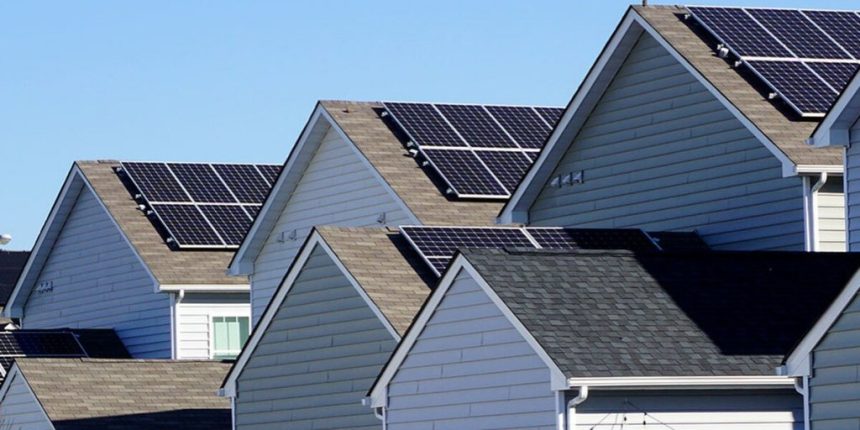Rooftop solar panels. (VCU Capital News Service)
The Virginia Department of Energy has officially gotten word that funding for the Solar for All program — which aimed to help lower- and moderate-income households build solar panels on their roofs — has been rescinded by the federal government.
Virginia had been awarded $156 million that would have aided an estimated 15,000 households install rooftop solar or buy into community solar projects. The state had not started rolling out the program or taken applications yet.
The program that started under the Biden administration would have provided $7 billion to states to implement it. The funding was clawed back under the One Big Beautiful Bill Act, as part of government efficiency and the rollback of renewable energy programs enforced by President Donald Trump’s administration.
“The bottom line again is this: EPA no longer has the authority to administer the program or the appropriated funds to keep this boondoggle alive,” EPA Administrator Lee Zeldin said in a video posted to X. “With clear language and intent from Congress in the One Big Beautiful Bill, EPA is taking action to end this program for good. We are committed to the rule of law and being a good steward of taxpayer dollars.”
Virginia had chosen to use the first year of funding to establish an avenue for implementing the program, meeting with stakeholders and formulating rules but had yet to select an administrator. Applications for the grants were going to open to the public in January. Now advocates for solar are frustrated over the loss.
“You know, having grown up in a low-income community, it’s just that same vicious cycle, right? Where folks say ‘we got this money, we’re gonna help you, we want to do this.’ And then at the 11th hour, it’s, you know, we ain’t got that no more,” said Branden Praileau, the Virginia Program Director at Solar United Neighbors. ”It’s another sad commentary of the most marginalized and the most energy burdened, continuing to be left behind.”
Praileau explained that disadvantaged families would have benefitted from solar panels on their roofs by offsetting their energy bills with the production of energy from the panels. However much energy the panels produced would be subtracted from their energy bills each month.
“The ability to reduce that energy burden by offsetting what they produce versus what they consume, literally puts money back in people’s pockets,” Praileau said. ”I can speak from a life experience there. Since we’ve been solar at my church, we’ve been able to take the 25-30% that we’ve been saving yearly in energy, and roll it into outreach ministry.”
Richard Borean, a spokesperson for the Virginia Department of Energy, said that approximately $730,000 had been spent so far during the planning period and will still be covered by the funding previously awarded. The federal government will take back the rest of the unspent award. The department is in the process of creating a webpage called “Virginia Energy Connect,” a one-stop-shop that will allow homeowners to find energy programs they qualify for cohesively. The site is expected to launch in the coming months.
Borean also highlighted efforts by the state to invest in an “all of the above” energy profile through renewable energy, nuclear, grid reliability, etc.
The reconciliation bill that was signed into law on July 4 also does away with the 30% tax credit for the installation of solar panels on homes starting at the end of this year. Praileau said this will create even more barriers for homeowners who are interested in solar for their homes but don’t have the means to pursue it without grants and tax credits.
Praileau said the rooftop solar projects would have helped cash-strapped households get repairs to their roofs for installation. He also pointed out that many of the homes that would have qualified for this funding have not been updated in decades and don’t have ways to become more energy efficient to lower their power bills.
Clean energy advocates have said they plan to appeal the decision to end the program since the money had already been allocated to the 60 recipients.









